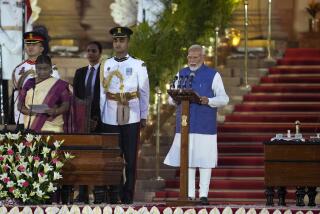Hindu Party Gets Nod to Form India Government
NEW DELHI — Ending a week of great suspense, India’s president on Wednesday called on Hindu nationalists to govern the world’s most populous democracy for the first time.
The Bharatiya Janata Party quickly accepted the summons, vowing to work “for change, for good government, for decentralization and against corruption.” But its grip on power, disputed from the start, may not last the month.
The prime minister designate, Atal Behari Vajpayee, a former foreign minister and opposition leader in Parliament, is to be sworn in today. He will succeed P.V. Narasimha Rao of the Congress (I) Party.
At a triumphant news conference outside his party’s headquarters, Vajpayee, one of the nation’s most respected politicians and best orators, took pains to reassure Indians that his party, whose sweeping if vague ideal is Bharatiyata, or “Indianness,” will not discriminate against anyone.
“We have clearly stated that we will treat all citizens alike on an equal footing--there will be no discrimination on the basis of religion, region, caste or class,” he said.
*
In December 1992, a march championed by the BJP degenerated into the razing of a mosque in Ayodhya, the northern town said to be the birthplace of the Hindu god-king Ram. Bloody Hindu-Muslim riots then broke out in Bombay and other cities in which more than 2,500 people, mostly Muslims, died.
Since then, the BJP has been working to persuade all elements of Indian society that they have nothing to fear from it. In a televised interview Friday, Vajpayee sought to assure Indians that their first BJP government would not mean a radical shift in the ground rules of society.
The country, he said, will remain secular, and Muslims, who are 11% of the population and have been the traditional bugbear of Hindu nationalists, should not fear discrimination. “Hinduism will not be the state religion,” Vajpayee said.
The BJP sprang up 16 years ago as the political arm of a volunteer corps created in 1925 with the mission of sparking a Hindu revival in India, then under British rule. In the 1930s, the corps’ leaders expressed admiration for the Nazi purges of the Jews and said Hindus should learn from them.
“We are committed to secularism,” BJP President Lal Krishna Advani has said about his party’s current views. “But that should not mean that the country disowns its personality. Essentially, it is Hindu, and Hindus have been made to feel apologetic about their identity.”
Zafar Agha, a journalist and political analyst, is one of many Indian Muslims who are skeptical that the BJP has changed its spots. “The indication from the top people is that they would not rush to act out their agenda,” he said. “But at one point, the hawks would push the party to take a harder line.”
An advocate of economic reform before the Congress government began opening up India to the world in 1991, the BJP favors continued deregulation and privatization of state-owned industries. But its overt bias is for local industry, and while it welcomes capital from overseas firms to improve India’s aging and overtaxed infrastructure, it opposes the entry of foreign consumer goods that add little to India’s technology or economic might.
“Yes to computer chips, no to potato chips,” has become a BJP mantra.
After coming to power in Bombay’s state of Maharashtra with another right-wing party last year, the BJP shut down a power plant project being built by Houston-based Enron Corp., then allowed construction to go ahead after renegotiating the deal.
In New Delhi, a BJP administration temporarily closed a Kentucky Fried Chicken outlet because two flies were found in the kitchen.
*
For many Indians, religion aside, the BJP, or Indian People’s Party, is a credible alternative to Congress, which is besmirched by corruption scandals.
Vajpayee’s swearing-in will not end the uncertainty about who leads India. The BJP is still far short of a majority in the dominant lower house of Parliament.
On Wednesday, President Shankar Dayal Sharma gave Vajpayee, 69, until May 31 to cobble together a government. But because of the BJP’s past and its politics, many doubt that he can.
India’s new government “would be an eight-day wonder,” predicted V.N. Gadgil, spokesman for Congress. He said Congress will oppose it.
More to Read
Sign up for Essential California
The most important California stories and recommendations in your inbox every morning.
You may occasionally receive promotional content from the Los Angeles Times.










